|

|

|

|

|

|
|
Saturday,
April 25, 2009
 Best
Foot Backwards
- This past March, I was able to start a fantastic spring break
hike through the Grand Canyon, accompanied by hiking buddies John
Eastwood, Bill Ferris and Chris Forsyth. Although I had some
hope that we could cover the intended route in eight days, there was
an extra day built into the schedule to account for the fact that we
were hiking on the north side of the canyon, off trail for all but one
day, and, except for a couple of river parties we saw, alone.
Early on the eighth day, as we were climbing up a ravine upstream from
94 Mile canyon, I fell and sprained my foot. Although in quite a
bit of pain, I continued to hike up and out of the ravine, where we
decided to make an emergency 911 call and my hike came to an
end. I wrote a story about this incident for the local paper Best
Foot Backwards
- This past March, I was able to start a fantastic spring break
hike through the Grand Canyon, accompanied by hiking buddies John
Eastwood, Bill Ferris and Chris Forsyth. Although I had some
hope that we could cover the intended route in eight days, there was
an extra day built into the schedule to account for the fact that we
were hiking on the north side of the canyon, off trail for all but one
day, and, except for a couple of river parties we saw, alone.
Early on the eighth day, as we were climbing up a ravine upstream from
94 Mile canyon, I fell and sprained my foot. Although in quite a
bit of pain, I continued to hike up and out of the ravine, where we
decided to make an emergency 911 call and my hike came to an
end. I wrote a story about this incident for the local paper
and it ran on
Thursday,
April 2. If you follow the link, you can read the on-line
version, which, for some odd reason, is identified as being published
on Friday, April 3), which is reprinted below, with my original title:
|
A
Grand Canyon Adventure in 8 Days and 4 Minutes
by Dennis Foster
Hiking off-trail in the Grand Canyon isn’t necessarily
fraught with peril, but it is a challenge. From picking
the right routes, reading maps well, following previously
written accounts, and taking care in hiking through steep
terrain, you expect to get bumps, bruises, scratches, aches
and pains. In over thirty years of hiking in the Grand
Canyon, I have had many accidents, but never one that required
any external help. That was about to change.
It was the eighth day of a sweeping nine day hike through wild
and remote sections of the Grand Canyon, north of the Colorado
River and west of the popular South Rim Village.
Accompanying me were John Eastwood, Bill Ferris and Chris
Forsyth. That morning, we had made an early start up a
thousand foot ravine that would take us from a beach at 94
Mile Canyon to the broad and expansive Tonto Plateau. I
entered the ravine healthy and in good spirits, but exited
with a debilitating injury that would end my hike.
My accident occurred in an unassuming spot – no worse than a
hundred others we had been scampering up and down for more
than a week. I had tried to lift and push myself up past
two big boulders, but I didn’t have enough lift. I
rose briefly and then fell back. I could feel I was
going to fall back into a six foot deep slickrock trough, head
first. Somehow, I was able to whip my left leg down
behind me, using my left foot to brake my momentum. It
worked. I recall an instant of clarity when I was amazed
that my boot could bend so much, pushing toe to heel.
Then, I stopped and dropped to the ground in agonizing pain.
No apparent broken bones in my foot, but it hurt badly and was
beginning to swell.
I knew that I couldn’t stay in the ravine even if my hike
was over. John and Chris took possession of my pack and
we continued climbing some 700 feet to reach the top.
While this climb should have taken less than an hour, it took
me three, as I used my good foot, my hands, my rear end and an
occasional pivot on my left heel. Along the way, I would
drop to my knees in pain if that foot rolled a little bit to
either the left or the right.
Once out of the ravine, it took about a half hour to reach a
small saddle on the Tonto. Here, we decided it was time
to access the 911 emergency service on our SPOT satellite
personal tracker. Two hours later, a Park Service SAR
helicopter arrived. The crew – Bryce, Jessica and
Brandon – were professional and came prepared to help in any
way they could, including ample water for my companions who,
because of the hours lost due to my plight, were now racing
against the clock to get to a water source in Trinity Creek
before exhausting their own supplies.
Once suited up and strapped into my seat, I waved to my hiking
buddies. We were nearing the end of our hike. They
would reach the South Rim in the early evening the next day.
I would reach the South Rim in four minutes. The flight
was quite a surreal experience, as the landscape dropped away
below me and the temples and buttes that we had spent hours
walking around flashed by in an instant. The SAR crew
had expressed concern that the bumpy ride might cause me to
become nauseous. However, I found that I was more than
overwhelmed by the bittersweet nature of the moment.
In the late afternoon, I was having X-rays taken at the
Flagstaff Medical Center. I was lucky, as nothing was
broken in my badly swollen foot. Still, I am using
crutches and my recovery time will likely be ten days to two
weeks.
On my map of the Grand Canyon, showing all of my hikes, there
is a small gap keeping me from having a complete route on the
north side of the canyon, east to west between Nankoweap
Canyon and Kanab Creek. I tried to close this gap in
1984 and again in 1991. Both times, I turned back from a
steep climbing route I found to be too risky for me to
attempt. The hike I had just finished was meant to
bypass that climbing route. The gap remains.
Dennis
Foster has been on over 250 separate hikes in the Grand Canyon
since 1977, ranging from a few hours to ten days, and has
spent over 300 nights camped in its backcountry. |
There
are some details here that couldn't work their way into the newspaper
story, which I can raise here. First, as a matter of some
improbability, I just happened to take a photo of the spot where I was
about to fall. Chris had
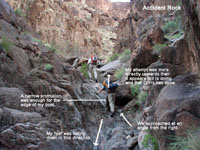 climbed
up through these rocks, and Bill was just about to do so. I was
about twenty feet behind, and had a nice view looking up the ravine,
so I snapped the picture to the left. If you click on the
photo, you can see a larger view, with the annotations. Or,
click
here
to just see the photo. As you can probably see, it
isn't really much of a spot. We had been hiking for about thirty
minutes, so were very fresh and a bit warmed up. We were
carrying a lot of water, but we were doing that every morning for the
last few days. The reason for my calamity was that I overreached
for a small protruding rock surface with my left foot. It was
just a bit too high, so that when I pushed off with my right foot,
there wasn't enough lift left in my leg. climbed
up through these rocks, and Bill was just about to do so. I was
about twenty feet behind, and had a nice view looking up the ravine,
so I snapped the picture to the left. If you click on the
photo, you can see a larger view, with the annotations. Or,
click
here
to just see the photo. As you can probably see, it
isn't really much of a spot. We had been hiking for about thirty
minutes, so were very fresh and a bit warmed up. We were
carrying a lot of water, but we were doing that every morning for the
last few days. The reason for my calamity was that I overreached
for a small protruding rock surface with my left foot. It was
just a bit too high, so that when I pushed off with my right foot,
there wasn't enough lift left in my leg.
I didn't hike too far from this spot before giving up on carrying my
pack. Chris had offered to continue on and drop his pack at the
top of the ravine and return to carry my pack up. In fact, he
and Bill hiked up quite a ways and then Bill shuttled their two packs
the rest of the way to the Tonto level. Meanwhile, John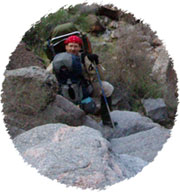 decided to shuttle his and my packs until Chris returned. But,
he changed his mind on this score and decided to carry both packs at
the same time - mine
strapped to the front of him, as you can see by the photo. When
we got to the top of the ravine, we were all resting together and
talked over the situation. Our best hope was that, while sore, I
would be able to continue hiking, even if only slowly. We would
hope to make the water in Trinity, and, with a full night's rest,
perhaps my foot would have improved significantly. I was not
hopeful on this score. I have hiked on sprained ankles before,
but this situation was quite a bit worse. As I noted in the
story, it took us about a half hour to reach a nearby saddle, where we
revisited the situation and decided on the 911 call. Altogether,
it had been about four hours after my accident, so I think we gave it
enough time to be sure. Still, as long as I wasn't walking, I
wasn't in any pain. I could sit and rest and relax and feel just
like normal.
decided to shuttle his and my packs until Chris returned. But,
he changed his mind on this score and decided to carry both packs at
the same time - mine
strapped to the front of him, as you can see by the photo. When
we got to the top of the ravine, we were all resting together and
talked over the situation. Our best hope was that, while sore, I
would be able to continue hiking, even if only slowly. We would
hope to make the water in Trinity, and, with a full night's rest,
perhaps my foot would have improved significantly. I was not
hopeful on this score. I have hiked on sprained ankles before,
but this situation was quite a bit worse. As I noted in the
story, it took us about a half hour to reach a nearby saddle, where we
revisited the situation and decided on the 911 call. Altogether,
it had been about four hours after my accident, so I think we gave it
enough time to be sure. Still, as long as I wasn't walking, I
wasn't in any pain. I could sit and rest and relax and feel just
like normal.
When the helicopter arrived, we learned
that they had gotten the 911 message about 20 minutes after we sent
it out - the signal goes to a facility in Texas and they have to
track down the appropriate emergency responders. Then, the
folks at the Park Service had to do some investigating on who we
were and what circumstances we were likely
 facing
before sending out the copter. The pilot, Bryce, was from
Flagstaff and knew my colleague Doug Brown, and Doug's
son, who was a student of mine some years ago and with whom I have
been on a couple of hikes. Jessica was the flight operations
manager and Brandon was the EMT. Only later did someone point
out to me that we were not visited
by the usual Park Service helicopter. Where was that one?
In another twist of irony, it was sitting on the tarmac
at an air show down in Phoenix, where Cara Lynn and Eric were for the
day! The NPS called her up, since she was listed as an emergency
contact on my permit. When I talked to her a short time later,
she took the photo to the left, of the NPS bird down in Phoenix. facing
before sending out the copter. The pilot, Bryce, was from
Flagstaff and knew my colleague Doug Brown, and Doug's
son, who was a student of mine some years ago and with whom I have
been on a couple of hikes. Jessica was the flight operations
manager and Brandon was the EMT. Only later did someone point
out to me that we were not visited
by the usual Park Service helicopter. Where was that one?
In another twist of irony, it was sitting on the tarmac
at an air show down in Phoenix, where Cara Lynn and Eric were for the
day! The NPS called her up, since she was listed as an emergency
contact on my permit. When I talked to her a short time later,
she took the photo to the left, of the NPS bird down in Phoenix.
Once on the ground at the South Rim, the NPS dispatcher, Della, gave
me a ride to the Maswik lodge, where I would wait for my sister, Sue,
and her significant other, Tom, to come and pick me up and drive me back to
Flagstaff. Just to provide full disclosure, I have included a
photo of my foot, comparing it to my good one. This was taken
the next evening, and significant swelling would continue for some
many days.
significant other, Tom, to come and pick me up and drive me back to
Flagstaff. Just to provide full disclosure, I have included a
photo of my foot, comparing it to my good one. This was taken
the next evening, and significant swelling would continue for some
many days.
Although I thought I would be back to normal in a couple of weeks, it
has taken
longer. For the first two days, I stayed at home and needed to
use both crutches to get anywhere around the house. Then, for
about five more days, I needed them only in the morning when I got
up. After moving around a bit, I found I was able to use just
one crutch to get around the rest of the day. I did that for
about five days, and then switched to just using my hiking pole for
light support and to keep from falling over while walking. About
two weeks after the accident, I stopped using the hiking pole, but I
still walked slowly and with a noticeable limp. It has now been
just over one month and I am walking at about 95% of my normal speed
and don't exhibit too much of a limp. But, I can still feel
soreness on the top of my foot, and won't try any jogging or hiking
for some time to come.
|
|

|
|
Wednesday,
May 27, 2009
  Self-Orienting
Maps, et al.
- This past Memorial Day weekend, Cara Lynn and I took a day trip
to see Shaman's Gallery (or, is it Shamans? or Shamans'? or, call it
Gordon's
Panel). Anyway, on the road we were listening to the radio
and some commentator on NPR was whining about the demise of newspapers
and how they would miss the Self-Orienting
Maps, et al.
- This past Memorial Day weekend, Cara Lynn and I took a day trip
to see Shaman's Gallery (or, is it Shamans? or Shamans'? or, call it
Gordon's
Panel). Anyway, on the road we were listening to the radio
and some commentator on NPR was whining about the demise of newspapers
and how they would miss the
 tactile
sense of holding the news in their hands, while sipping on their
latte. Give me a break! That got us to talking about how
innovations are, by and large, improvements. So, while I am not
inclined to sit down with my cup 'o joe and a
Kindle,
I can imagine that innovations will continue apace and we will have a
suitable substitute for the "newspaper experience."
Some years ago, I had heard of
paper
thin LCD screens
that would allow for downloaded material into a
book that you could read as a book. [And, when you were done,
you can just clear the pages.] The technology goes by the name
of "electronic
ink," or
"electronic
paper." tactile
sense of holding the news in their hands, while sipping on their
latte. Give me a break! That got us to talking about how
innovations are, by and large, improvements. So, while I am not
inclined to sit down with my cup 'o joe and a
Kindle,
I can imagine that innovations will continue apace and we will have a
suitable substitute for the "newspaper experience."
Some years ago, I had heard of
paper
thin LCD screens
that would allow for downloaded material into a
book that you could read as a book. [And, when you were done,
you can just clear the pages.] The technology goes by the name
of "electronic
ink," or
"electronic
paper."
So, with our thinking caps on, we
developed how this would work to supplant newspapers. First,
pick the newspaper size that suits you. Then, hook up to the
internet (hmm . . . can this be done wirelessly?) and download
whatever paper you want. Or, some combination of papers.
And, you can tailor the paper as you see fit - sports first, or
national news, maybe with a cartoon at the bottom of each page,
instead of all on one page. You can read it as four pages, and
hit scrolling buttons to advance to later pages. Or, you can
jump to the rest of the story you are reading directly. At
first, I doubt that this faux newspaper will really feel like a
newspaper, but over time, it may well resemble the real deal.
And, that led us to another innovation: self-orienting
maps. As we were traveling along dirt roads, mostly unmarked, I
was armed with a topo map 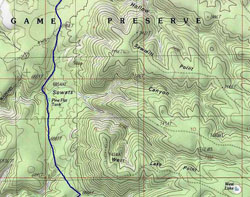 and
estimating our position by noting when we would meet up with
intersecting roads. Remarkably effective, although there are
more side roads than are shown on the old map! Well, the dilemma
here is that maps are oriented with north at the top and we were
driving south. I have almost always kept the map in its printed
orientation and made mental notes that roads on "map left"
were going to show up on my right, and vice versa. Yeah, that
gets confusing. But, on my recent spring break hike, I noticed
that Bill Ferris
always held
his map oriented to his direction of travel. Then, he just
needed to read labels and numbers sideways and upside down.
After a while, I decided I liked this approach. So, on our drive
to Shamans Gallery, I decided to orient the map with south at the
top. That worked great, but we still had to contend with reading
information upside down. and
estimating our position by noting when we would meet up with
intersecting roads. Remarkably effective, although there are
more side roads than are shown on the old map! Well, the dilemma
here is that maps are oriented with north at the top and we were
driving south. I have almost always kept the map in its printed
orientation and made mental notes that roads on "map left"
were going to show up on my right, and vice versa. Yeah, that
gets confusing. But, on my recent spring break hike, I noticed
that Bill Ferris
always held
his map oriented to his direction of travel. Then, he just
needed to read labels and numbers sideways and upside down.
After a while, I decided I liked this approach. So, on our drive
to Shamans Gallery, I decided to orient the map with south at the
top. That worked great, but we still had to contend with reading
information upside down.
But, we got to thinking about the newspaper idea and decided this
technology would also work for maps. First, it would be cool to
just download your map onto a standard sized sheet (bigger than 8.5 x
11, I would think). And (a drum roll, please), as you turned the
map to orient it in the direction you are traveling, the labels and
numbers would rotate with you! Sign me up. And, if you
could write electronic notes on your map (with a stylus), you can then
download it to your PC when you get home. Probably there are
plenty of other accessories that people would want on these
maps. Perhaps, I'll solicit ideas from the folks at the Yahoo
Grand Canyon group.
|
|

|
|
Tuesday,
June 2, 2009
 Shamans'
Gallery
- For some years, I have been thinking about a return to Shamans'
Gallery, so that I can take some digital photos. After my first
(and only) visit in 1996, I thought that this could be done as part of
a really long day trip from Flagstaff. Cara Lynn was interested
in going, so off we went on the Sunday before Memorial Day, 2009. Shamans'
Gallery
- For some years, I have been thinking about a return to Shamans'
Gallery, so that I can take some digital photos. After my first
(and only) visit in 1996, I thought that this could be done as part of
a really long day trip from Flagstaff. Cara Lynn was interested
in going, so off we went on the Sunday before Memorial Day, 2009.

For the full story:
Tuckup
Trail to Shamans' Gallery
in the Hiking Grand Canyon section of the Kaibab Journal
|
|

|
|
Tuesday,
June 9, 2009
 The
"Fairness" Dogma
- When I am teaching, I try to impart this little nugget to my
students - "I cannot treat you fairly; I strive to treat you
equally." As an example, I will sometimes talk about a
student whose car breaks down in Phoenix, meaning that they are unable
to return to school in time for an exam. Should I give them a
make-up test? What about the student who decided not to push
their luck, who also went to Phoenix, but returned to school a day
earlier, so that if their car broke down, they'd still have time to
get back to school? Or, what about a student that decided to
forgo a trip to Phoenix the weekend before a major exam? How
would giving a make-up exam be fair to the other students that took
proactive steps to insure that they were here? Well, there is
the rub. The student that The
"Fairness" Dogma
- When I am teaching, I try to impart this little nugget to my
students - "I cannot treat you fairly; I strive to treat you
equally." As an example, I will sometimes talk about a
student whose car breaks down in Phoenix, meaning that they are unable
to return to school in time for an exam. Should I give them a
make-up test? What about the student who decided not to push
their luck, who also went to Phoenix, but returned to school a day
earlier, so that if their car broke down, they'd still have time to
get back to school? Or, what about a student that decided to
forgo a trip to Phoenix the weekend before a major exam? How
would giving a make-up exam be fair to the other students that took
proactive steps to insure that they were here? Well, there is
the rub. The student that  missed
the exam argues that it is "unfair" that they are penalized
for missing a test for reasons "beyond their control."
Of course, the point is that we do have control over our actions, and
we must accept the costs of our decisions, even though we have an
incentive to try and shift those costs to someone else. missed
the exam argues that it is "unfair" that they are penalized
for missing a test for reasons "beyond their control."
Of course, the point is that we do have control over our actions, and
we must accept the costs of our decisions, even though we have an
incentive to try and shift those costs to someone else.
I do take into consideration serious medical conditions, but even here
it is a bit problematic. Some years ago, a student missed an
exam due to an auto accident that sent him to the hospital with a
fractured skull. Sounds like an easy decision on my part.
But, later I found out that the accident was his fault - he was
driving drunk at the time. So, I wish I could have changed my
decision on that one, but so it goes. Consequently, my policy on
missed exams is pretty simple and straightforward - no make-ups are
offered. Period. And, as a result, attendance for exams in
my classes is pretty much about 98%. So, the point here that I
try to make to my students is that I treat them all equally, which is
not fair. I am not sure that they really get it, but there are
plenty of examples of how government policy changes the rules of the
game and, in the name of "fairness" in fact is an exercise
in the opposite.
 Grand Canyon
Hiking Permits.
I was up at the canyon on Sunday, May 31 to stop by the Backcountry
office and pick up a number for a place in line for the next day,
June 1. That is the first day that permits can be obtained for
overnight hikes this coming October, which, of course, is an excellent
time to hike in the canyon. I was at the office at 9:30 a.m. on
Sunday, an hour and a half after they opened. Nobody was in the
lobby, so I got to see a ranger right away, and I got number 71.
So, there must have been quite a few people there at 8:00 a.m.
Grand Canyon
Hiking Permits.
I was up at the canyon on Sunday, May 31 to stop by the Backcountry
office and pick up a number for a place in line for the next day,
June 1. That is the first day that permits can be obtained for
overnight hikes this coming October, which, of course, is an excellent
time to hike in the canyon. I was at the office at 9:30 a.m. on
Sunday, an hour and a half after they opened. Nobody was in the
lobby, so I got to see a ranger right away, and I got number 71.
So, there must have been quite a few people there at 8:00 a.m.
On Monday, June 1, I was up there again, this time to actually get a
permit for October. I showed up at 9:30 a.m. and the three
rangers manning the office were up to number 30. I got served at
11:00 a.m. and got all the permits I wanted. Which is why people
show up in person. The alternative is to send a request to the
office. If you go through the mail, the postmark cannot be any
earlier than June 1, even though it takes days to arrive at the
office. Or, you can fax a request in, starting at 12:00
midnight, which is what a lot of avid hikers tend to do. Of
course, they suffer from two problems. First, they don't get
served ahead of those actually present and in the line. [In
fact, a couple of years ago, I was there on November 4th, to get
permits for March, and they still hadn't been able to go through all
the faxed 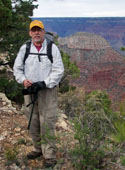 requests.]
The other problem is that you can't tweak your written request like
you can do in person. For example, on the Sunday I went up to
pick up a number, I also got a permit for September. Since the
window for that month had been open for 31 days, I couldn't get my
first 25 choices! [Well, it was 25 variations on a simple plan,
but there was always some bottleneck in making each option
work.] So, while I got my 26th choice, you can't get this kind
of flexibility with a fax. requests.]
The other problem is that you can't tweak your written request like
you can do in person. For example, on the Sunday I went up to
pick up a number, I also got a permit for September. Since the
window for that month had been open for 31 days, I couldn't get my
first 25 choices! [Well, it was 25 variations on a simple plan,
but there was always some bottleneck in making each option
work.] So, while I got my 26th choice, you can't get this kind
of flexibility with a fax.
So, on Monday, I was sitting next to a
woman holding number 77. She made a comment about how next
year all permit requests will have to come in by fax, so that there
is no advantage to those who are there in person.
Consequently, she deemed that this new system would be "fair."
I politely disagreed and commented that 20 years ago I made a
lifestyle choice to live in Flagstaff so that I could maximize my
ability to hike in the Grand Canyon. I could have sought out
other places to live, where I might maximize my income, but that
isn't what I wanted to maximize. So, I live in Flagstaff,
where costs are higher than average with a job that pays less than
average. Indeed, it took years of working part-time just to
get into a full-time teaching job. So, if the system changes
so that everyone who participates is given the same chance to get a
permit, that change disadvantages me. From my perspective it
is "unfair." I don't think that the park service will be
compensating me for 20 years of sacrificed income.
So, what is "fair?" It is not the equalization of the
chance to get a hiking permit. Equal is equal, and not likely to
also be "fair." Who will argue that this is
"fair?" Clearly, it will be those that are advantaged
by this change. And, will anyone look at such a biased
perspective and see it for what it is? I don't think so.
And, what would be "fair?" I have no idea, and I don't
think anyone else does either. [Well, to the woman next to me,
and the man across the table from me, I suggested an auction for
permits, which they both thought was unfair!!] What I do know, is that the
government makes the rules and we have an incentive to adapt our
behavior based on these rules. When the rules change, it negates
the choices we have made, and that is certainly unfair.
Some other examples of this process:
 Canyon Forest
Village.
When the Forest Service considered a land swap along the border of the
Grand Canyon, the decisions made by a host of private economic agents
(e.g., to build a hotel in Flagstaff, Williams or Tusayan) were
negated and they faced the prospect of having their livelihoods ruined as a
consequence. Canyon
Forest Village would be built on land that no others could bid on,
favorably located next to the park. In reports I helped author,
we argued that this was patently unfair. While we all know the
risks associated with market dynamics - someone could decide to build
another hotel in these cities and compete away business from existing
firms. But, to now factor in the notion that the government can
step in and make arbitrary changes that ruin your business is
practically impossible to factor into
Canyon Forest
Village.
When the Forest Service considered a land swap along the border of the
Grand Canyon, the decisions made by a host of private economic agents
(e.g., to build a hotel in Flagstaff, Williams or Tusayan) were
negated and they faced the prospect of having their livelihoods ruined as a
consequence. Canyon
Forest Village would be built on land that no others could bid on,
favorably located next to the park. In reports I helped author,
we argued that this was patently unfair. While we all know the
risks associated with market dynamics - someone could decide to build
another hotel in these cities and compete away business from existing
firms. But, to now factor in the notion that the government can
step in and make arbitrary changes that ruin your business is
practically impossible to factor into 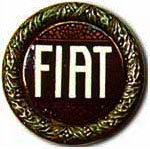 rational
decision-making. rational
decision-making.
 Holders of
Chrysler and GM bonds.
As I write this, some Chrysler bondholders have protested the
government's plan for Fiat to buy up a bankrupt Chrysler, because they
get less back on their investment than those that should be further
back in the creditor's line. The Supreme
Court will take a closer look at this deal. This arbitrary
rearrangement of the economic landscape will come at a severe price -
who will make long term investments in these firms if their rights can
be unilaterally disposed of by the government?
Holders of
Chrysler and GM bonds.
As I write this, some Chrysler bondholders have protested the
government's plan for Fiat to buy up a bankrupt Chrysler, because they
get less back on their investment than those that should be further
back in the creditor's line. The Supreme
Court will take a closer look at this deal. This arbitrary
rearrangement of the economic landscape will come at a severe price -
who will make long term investments in these firms if their rights can
be unilaterally disposed of by the government?
 Parties using
Gold Clause Contracts.
In the 1930s, the Congress prohibited gold
clauses in contracts. These were popular when a lender was
afraid that the currency was being devalued. So, instead of
being paid back in currency terms, the resolution of the loan was
stated in terms of the value of some amount of gold.
Essentially, this is an inflation hedge. In one of the worst
decisions ever made by the Supreme Court, the Congressional Act was
upheld.
Parties using
Gold Clause Contracts.
In the 1930s, the Congress prohibited gold
clauses in contracts. These were popular when a lender was
afraid that the currency was being devalued. So, instead of
being paid back in currency terms, the resolution of the loan was
stated in terms of the value of some amount of gold.
Essentially, this is an inflation hedge. In one of the worst
decisions ever made by the Supreme Court, the Congressional Act was
upheld.
The problem with the government changing
its policies and rules, predicated on "fairness," is that they undo
countless rational decisions made by all of us. We respond to
our environment. We mold our behavior based on the incentives
that we face. "Fairness" is unlikely to have anything to do
with the political pressure for change exerted by special interests.
|
|

|
|
Sunday,
June 14, 2009
 Jicarilla
Point Petroglyphs
- I
had been to see the cool petroglyph panels below Jicarilla Point three
times - twice in 1981 and once in 1991. I haven't been able to
track down any photos from my 1981 trips, and I only have a scant dozen
that I took on the trip ten years later. In this digital age, I
have been doing a lot of repeat visits to special places like this,
partly with an eye to compiling a much fuller photographic record. Jicarilla
Point Petroglyphs
- I
had been to see the cool petroglyph panels below Jicarilla Point three
times - twice in 1981 and once in 1991. I haven't been able to
track down any photos from my 1981 trips, and I only have a scant dozen
that I took on the trip ten years later. In this digital age, I
have been doing a lot of repeat visits to special places like this,
partly with an eye to compiling a much fuller photographic record.
For the full story:
Jicarilla
Point Petroglyphs
in the Hiking Grand Canyon section of the Kaibab Journal
|
|

|
|
Saturday,
June 20, 2009
 Beck
for Prez?
- As
far as I can tell, Glenn Beck
is on a huge upswing
in popularity. I might entertain the notion that it is just
me. That is, because he is more popular with me, does that mean
he is more popular in general? Well, maybe. But, if he's
getting dumped on by Jon Stewart, Stephen
Colbert and the harpies at The View, he must be pushing somebody's
buttons. Beck
for Prez?
- As
far as I can tell, Glenn Beck
is on a huge upswing
in popularity. I might entertain the notion that it is just
me. That is, because he is more popular with me, does that mean
he is more popular in general? Well, maybe. But, if he's
getting dumped on by Jon Stewart, Stephen
Colbert and the harpies at The View, he must be pushing somebody's
buttons.
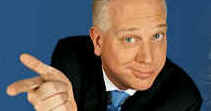 I first saw Glenn Beck when he had his show on CNN. When he
showed up on Fox this spring, I was more dogged about catching his
show, and loving just about every minute of it. He is funny,
articulate and appropriately outraged by the nonsense that goes on in
our government.
I first saw Glenn Beck when he had his show on CNN. When he
showed up on Fox this spring, I was more dogged about catching his
show, and loving just about every minute of it. He is funny,
articulate and appropriately outraged by the nonsense that goes on in
our government.
He is quite the multi-faceted entertainer, and doesn't really seem to
miss a beat in selling himself to his audience. In early June,
he put together a tour covering six cities, including nearby
Phoenix. So, Cara Lynn, Eric and I headed down to the desert on
June 2 for his "Common Sense Comedy Tour." As a comedy
performer, I'd give him a B, but his content makes him a unique and
singular entertainer. And, he is funny.
So, the event was held at the Dodge Theater, where there is a giant
board that displays messages you can send via text. I tried to
do so, but the learning curve was too long for me to get on before the
show started. Still, a couple of the comments were some
variation on the theme, "Glenn Beck for President."
That got me to thinking . . .
One thing that distinguishes conservatives from liberals is that the
former are likely to distain political office. If you want a
smaller government that does less, you probably don't really want to
expend time, energy and effort to be a part of it. I mean,
wouldn't a libertarian basically run on a platform of, "I don't
want to do anything?" On the other hand, if you want
government to be bigger and do more, you might feel compelled to jump
into the fray so that you can help transform society into the image
you'd like.
I think that Glenn Beck
might make an excellent president, but his message belies any such
ambition. He extols the virtues of individualism, freedom and
liberty. These tenets tend to work against the notion that we
need a leader to follow. And, it is difficult to use this tack
if you want to build yourself up to be a leader. It just
doesn't work.
Alternatively, consider a liberal. Like President Obama.
He tells us that he can fix the struggling economy. He can
create (or, save) jobs. He can transition us to a green
economy. He can stop global warming. He can stop
pollution. He can solve our health care system. He can . .
. well, he can do everything! That would seem to be the perfect
criteria for "leader."
In another vein, I decided to send a short note to Beck. To wit:
Dear Mr.
Beck,
My family and I recently had the pleasure of seeing your
Common Sense performance in Phoenix, although the 300 miles we
drove, round trip from Flagstaff, meant we returned home in
the early a.m. hours Wednesday! Great stuff!

You have made much of the curtailing of our economic freedoms,
and I couldn’t agree with you more. But, there is the
obvious (or, is it?) fallout from these restrictions, perhaps
best summarized by Milton Friedman in his classic,
“Capitalism and Freedom:”
"On the one hand,
freedom in economic arrangements is itself a component of
freedom broadly understood, so economic freedom is an end in
itself. In the second place, economic freedom is also an
indispensable means toward the achievement of political
freedom." [Chapter 1, page 8, 1982
University of Chicago edition]
When I first read this, many years ago, I was bowled over.
While economic freedom cannot guarantee political freedom, you
cannot have the latter without the former. Isn’t this
a point that you should also be making? Too many people
fail to see the power of Friedman’s argument. For
example, if the government mandates pay levels for private
sector employees, they automatically constrain how well these
individuals can operationalize their rights to free speech.
Or, consider a different example - if the government decides I
cannot get enough gasoline to drive to Phoenix, then I can’t
participate in a Tea Party and my voice is made the weaker, as
a matter of government policy. This insidious result
should frighten us out of our wits!
Indeed, Friedman pulls no punches in this book, as he begins
by critiquing the famous quote from JFK’s inaugural, “Ask
not what your country can do for you; ask what you can do for
your country.” Writes Friedman:
"Neither half of
the statement expresses a relation between the citizen and his
government that is worthy of the ideals of free men in a free
society." [Introduction, page 1, 1982
University of Chicago edition]
Perhaps it is time to introduce a new generation of Americans
to the insights of Milton Friedman.
Keep up the good work!
Sincerely,
Dennis Foster |
While
Milton Friedman passed away in 2006, many have started to make
special arrangements to remember the famed economist on his
birthday. Mark your calendars - the date is July 31.
|
|

|
|
Saturday,
June 27, 2009
 The
Crystal Forest Caves
- Off the west side of Horseshoe Mesa, about four miles down the Grandview
Trail, is a well-traveled route to the "Cave of the
Domes." I don't know where this name comes from, aside from
the obvious description of features in the cave that are small domed
rooms . . . While this
cave is no longer on park maps, it is still relatively well-known by regular canyon
hikers. But, not too far from here is a group of caves, called Crystal
Forest, which are not well-known even by canyon regulars. There are three caves
here, and I don't know if each one is named, so I just refer to all
three as the "Crystal Forest Caves." The
Crystal Forest Caves
- Off the west side of Horseshoe Mesa, about four miles down the Grandview
Trail, is a well-traveled route to the "Cave of the
Domes." I don't know where this name comes from, aside from
the obvious description of features in the cave that are small domed
rooms . . . While this
cave is no longer on park maps, it is still relatively well-known by regular canyon
hikers. But, not too far from here is a group of caves, called Crystal
Forest, which are not well-known even by canyon regulars. There are three caves
here, and I don't know if each one is named, so I just refer to all
three as the "Crystal Forest Caves."

For the full story:
The
Crystal Forest Caves of Grandview
in the Hiking Grand Canyon section of the Kaibab Journal
|
|

|
|
Tuesday,
June 30, 2009
 Qwest
+ ESBI = Bull
- Most of my bills are paid off automatically - through my credit
card, or with an
EFT
from my bank. Consequently, I don't pay
real close attention to my bill on a monthly basis. But, I do
sort through them periodically. Recently, I was going through my
phone bills over the last six months. The charge for local
service and internet service runs about $60 a month. So, I was
ticking off the months - $60, $60, $60 - and I got to June's bill -
$75. Hmm. I looked over the bill, and found this on page
3: "Other Companies ESBI ETS Total
Charges $14.95," and a reference to page 5. So, I turned to
page 5 and it shows ESBI as the letterhead instead of Qwest.
Here is what is printed on this page: Qwest
+ ESBI = Bull
- Most of my bills are paid off automatically - through my credit
card, or with an
EFT
from my bank. Consequently, I don't pay
real close attention to my bill on a monthly basis. But, I do
sort through them periodically. Recently, I was going through my
phone bills over the last six months. The charge for local
service and internet service runs about $60 a month. So, I was
ticking off the months - $60, $60, $60 - and I got to June's bill -
$75. Hmm. I looked over the bill, and found this on page
3: "Other Companies ESBI ETS Total
Charges $14.95," and a reference to page 5. So, I turned to
page 5 and it shows ESBI as the letterhead instead of Qwest.
Here is what is printed on this page:
The
charges on this portion of your bill are for non-telecommunications
services and products ... This portion of your bill is provided as a
service to ESBI."
I was puzzled, to say the least. I had just signed up for
DirecTV, and wondered whether the phone hookup was related to this
charge. It seemed unlikely that they wouldn't bill me directly
for all of their services. The charges specified on my bill were
for "Intelicom Messaging." So, I got on-line and did a search on
ESBI (Enhanced Services Billing, Inc., although you wouldn't know that
from the bill nor from their web site!). I was deluged by web sites complaining about this
"service." I found nothing good. Nothing.
I did find a couple of newspaper stories that were superficial in this
regard. But, not one single positive comment about this company
nor about their "non-telecommunications" charges. FYI,
here are some of these sites:
It was too late to talk with a real person at Qwest, so I sent them an
e-mail (for which, I didn't get a reply for seven days!!). Then, based on
comments I read, I called the 800 number for ESBI that was on the
phone bill. The operator claimed that my stepson authorized the
charges. Of course, he didn't have any idea what this was all
about - based on the web complaints, I thought that was probably the
case.
The next day, I did call Qwest and told them of my complaint.
The operator there tried to inform me that they are required to pass
along bills like this and that mostly they are on the up and up.
I think she was just reading through a script and had no idea about
any of this. But, she was persistent about asking me if ESBI was
going to credit my account. I said I wasn't sure, but assumed
so. The Qwest operator decided the prudent thing to do was to
credit me directly. So, three cheers for her. With some
urging on my part, a block was placed on my line for "third party
billing" so this episode should be over. But, here are some
observations:
 Third party
charges are obsolete.
The Qwest rep tried to pass this off on
the deregulation of AT&T back in the day. Maybe. Her
comment was that this provided customers a conduit for choosing a
different long distance service, and having this charge showing up
on their regular phone bill. I pointed out that I have a
separate long distance service and they charge me directly.
Well, that's the way it is these days. Besides, nobody can
foist third party charges onto my electric bill, nor my gas bill.
So, the "regulated utility" argument for these charges is silly.
Third party
charges are obsolete.
The Qwest rep tried to pass this off on
the deregulation of AT&T back in the day. Maybe. Her
comment was that this provided customers a conduit for choosing a
different long distance service, and having this charge showing up
on their regular phone bill. I pointed out that I have a
separate long distance service and they charge me directly.
Well, that's the way it is these days. Besides, nobody can
foist third party charges onto my electric bill, nor my gas bill.
So, the "regulated utility" argument for these charges is silly.
 Qwest must
benefit.
While the rep claimed that Qwest had no choice in the matter, it does
say on the bill that it is "provided as a service to ESBI." And, I bet that ESBI pays for that service.
So, Qwest makes money here, without lifting a finger, and they can
always claim to be innocent in this scam.
Qwest must
benefit.
While the rep claimed that Qwest had no choice in the matter, it does
say on the bill that it is "provided as a service to ESBI." And, I bet that ESBI pays for that service.
So, Qwest makes money here, without lifting a finger, and they can
always claim to be innocent in this scam.
 Qwest does
benefit.
When I told the rep that I didn't want
this to happen again - I have had this phone line for 20 years and
this is the first time a third party charge has been made - she was
reluctant to follow-through with an offer to block these charges.
She said that she "could see if a block can be placed on this line."
See what? If Qwest was serious about the integrity of its
customer service, they should be willing to put blocks on these
charges at the drop of a hat.
Qwest does
benefit.
When I told the rep that I didn't want
this to happen again - I have had this phone line for 20 years and
this is the first time a third party charge has been made - she was
reluctant to follow-through with an offer to block these charges.
She said that she "could see if a block can be placed on this line."
See what? If Qwest was serious about the integrity of its
customer service, they should be willing to put blocks on these
charges at the drop of a hat.
 Qwest
inconsistent on customer service.
When I logged into my Qwest account, I was informed that I needed to
get a security code, because "Qwest values the privacy of
customer account
information." [It arrived two days ago, before the e-mail reply to
my original complaint!] Odd that they act so concerned about the
security of my account, but turn the other way on these bogus ESBI
charges. Which is it?
Qwest
inconsistent on customer service.
When I logged into my Qwest account, I was informed that I needed to
get a security code, because "Qwest values the privacy of
customer account
information." [It arrived two days ago, before the e-mail reply to
my original complaint!] Odd that they act so concerned about the
security of my account, but turn the other way on these bogus ESBI
charges. Which is it?
 ESBI is a sham.
Although
the Qwest rep claimed that these charges are usually on the up and
up, and somewhere I saw the claim that ESBI was one of the
larger players in this market, just take a look at their
web site to convince yourself that it is nothing but a sham.
Three pages - home, FAQ and customer service. No contact
information. No history. Only two questions on the FAQ
page and one of them directs the reader to the customer service page,
which is just a form to fill in. Warning!! Don't even
think about filling in the form, unless you want to be snared by their
scam.
ESBI is a sham.
Although
the Qwest rep claimed that these charges are usually on the up and
up, and somewhere I saw the claim that ESBI was one of the
larger players in this market, just take a look at their
web site to convince yourself that it is nothing but a sham.
Three pages - home, FAQ and customer service. No contact
information. No history. Only two questions on the FAQ
page and one of them directs the reader to the customer service page,
which is just a form to fill in. Warning!! Don't even
think about filling in the form, unless you want to be snared by their
scam.
 ESBI really is a
sham.
When
I talked to their operator, I was told that my stepson had
"authorized" this charge. But, the Qwest rep said that I was
the only authorized user of the line. So, how did ESBI
conclude that charging me was legit? Well, I don't think
legitimacy has anything to do with it, so they couldn't care less
about proper authorization. Conceivably, anyone who doesn't like
me could have signed me up for dozens of these phony-baloney services,
even going so far as to claim to be me.
ESBI really is a
sham.
When
I talked to their operator, I was told that my stepson had
"authorized" this charge. But, the Qwest rep said that I was
the only authorized user of the line. So, how did ESBI
conclude that charging me was legit? Well, I don't think
legitimacy has anything to do with it, so they couldn't care less
about proper authorization. Conceivably, anyone who doesn't like
me could have signed me up for dozens of these phony-baloney services,
even going so far as to claim to be me.
 How can ESBI
make money?
It isn't difficult
to see how ESBI can profit from this scheme.
Even if they refund and rebate angered customers, I think that only
solves their legal liability. But, they still make money in two
ways - first, from those that don't catch on, and second, from the
temporary holding of money that will be later refunded. Consider
how easily this works . . .
How can ESBI
make money?
It isn't difficult
to see how ESBI can profit from this scheme.
Even if they refund and rebate angered customers, I think that only
solves their legal liability. But, they still make money in two
ways - first, from those that don't catch on, and second, from the
temporary holding of money that will be later refunded. Consider
how easily this works . . .
Suppose that ESBI signs up about 65,000
people a month to bogus services, at $15 a pop. [Actually, it is
some other "company" that is doing the signing up; i.e., in
my case it was "Intelicom Messaging."] That will rake
in about $10 million. A month passes, and everyone is
refunded. Meanwhile, ESBI gets to keep $10 million a
month. If this rolls over every month, then this is a perpetual
holding. At an annual interest rate of, say, 5%, they'd make
$500,000 per year just from the temporary holding of this money.
If it usually takes two months to detect this fraud and get a refund,
their annual rake comes to double this amount, $1 million. If it
takes four months, on average, then they get $2 million. I doubt
that ESBI has very high operating cost - after all, look at their web
page! ESBI probably hires out operators from India to deal with
the refund issue, and may well be pocketing 80%, or more, of this
income.
The notion that ESBI is just a scam operation seems clear to me.
With a prompt refund policy, they may be able to keep their heads
above water, legally. But, it is still a scam. Florida
Governor Charlie Crist, when he was the state's Attorney General,
filed a motion
against Intelicom Messaging, and others, for fraudulent
practices. I don't know what became of that. On the other
hand, the FCC has ruled in favor
of ESBI in a complaint lodged against their billing
practices. I don't see how that is possible when, as I noted
earlier, doing a web search on ESBI will yield nothing but negative
comments.
|
|

|

|

|

|

|